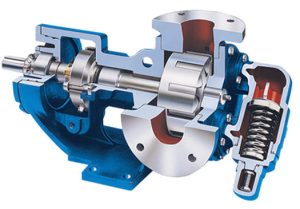We will be discussing about the selection of gear pump for Polyol with fillers added in it. Before going to the selection, let us first understand about the Types and Uses of POLYOLS and FILLERS.
POLYOLS
A polyol is an organic compound containing multiple hydroxyl (-OH) groups. A molecule with more than two hydroxyl groups is a polyol.
Types of polyols:
- Polyether polyols
- Polyester polyols
- Graft polyols (also called filled polyols or polymer polyols)
- Polycarbonate polyols
- Polycaprolactone polyols
- Polybutadiene polyols
- Polysulfide polyols
From all these polyols, we will be focusing on only 3 types of Polyols which are commonly used for PU foam industries i.e. Polyether polyols, Polyester polyols and Polymer polyols
- Polyether polyols: Polyether polyols which are made by the reaction of epoxides with an active hydrogen containing compounds.
- Polyester polyols: Polyester polyols are made by the polycondensation of multifunctional carboxylic acids and polyhydroxyl compounds.
- Graft polyols (also called filled polyols or polymer polyols): Graft polyols (also called filled polyols or polymer polyols) contain finely dispersed styrene–acrylonitrile, acrylonitrile, or polyurea (PHD) polymer solids chemically grafted to a high molecular weight polyether backbone. They are used to increase the load-bearing properties of low-density high-resiliency (HR) foam, as well as add toughness to microcellular foams and cast elastomers.
Uses of Polyols:
Polyols like Polyether polyols, Polyester polyols and Polymer polyols react with isocyanates to make polyurethanes, which find use to make mattresses, foam insulation for refrigerators and freezers, home and automotive seats, elastomeric shoe soles, fibers (e.g. Spandex), and adhesives etc.
Selection of Gear pump for Polyol with fillers:

1. High Viscosity:
Viscosity of Clear polyols and Polyols with fillers ranges from 100 cps to 20000 cps and even sometimes more than that, depeding on the temperature and types of polyols. In such cases while selecting the gear pump we need to be careful with the speed of the pump. Because for gear pump in order to tranfer the fluid efficiently and accurately, Gear pockets at suction should be given the enough time to fill with fluid. If not, void spaces will be filled with air pockets which in turn travel to the discharge and pump will create abnormal sound, even wear and tear of the internal parts. Also this inaccurate fluid transfer will result into developing the air pockets in the final PU foam slab which will be of no use rather than scrapping. So we must select the speed of the pump with respect to the viscosity of the fluid. Higher the viscosity lower will be the RPM.
2. Abrasive Nature:
Typically polyols are not abrasive in nature, but when it is added with fillers like Calium carbonate, Barium sulphate etc., it becomes very very abrasive. Fillers % varies between 10-100%. In such cases one must select hardened internal parts of the pump like Hardened gears, Hardened rotors, Hardened Idler Bushings, Hardened Idler Pin and so on. The most frequently failed iternal parts are Idler bushing and Idler Pin. In case of higher filler % we recommend to use hardened bushings like hardended Cast iron bushing, Tungsten carbide bushing. Also pin needs to be of hardened steel, Tungsten carbide. Higher the filler %, more and more hardened the internal parts.
3. Accurate Flow (Repeatable):
While selecting the pump for polyol with fillers or simply for the production of PU foams, we must remember accuracy and repeatability is most important. One must be thinking why accuracy and repeatibility is important. Suppose if pump is not delivering the accurate flow, mixing ratios of Polyol and Isocyanates which is set in the machines will not meet so it affects the quality of the final product. Not only the accuracy but also the repeatability is very much important.
4. Sealing Options:
As we know polyol with filler is very much abrasive fluid so selection of seal is also another important factor. In case of Polyol with filler, we must select Mechanical seal with Hardened seal faces. For example TiC/TiC faces. Also Mechanical seal with flushing arrangement or Gland packing will also be suitable.
5. MOC:
Cast Iron construction is usually acceptable. However, some process/ customers may require Carbon steel or Stainless Steel construction.
You can reach us at +91 98218 91092 or info@madhavfluid.com if you have any questions.



